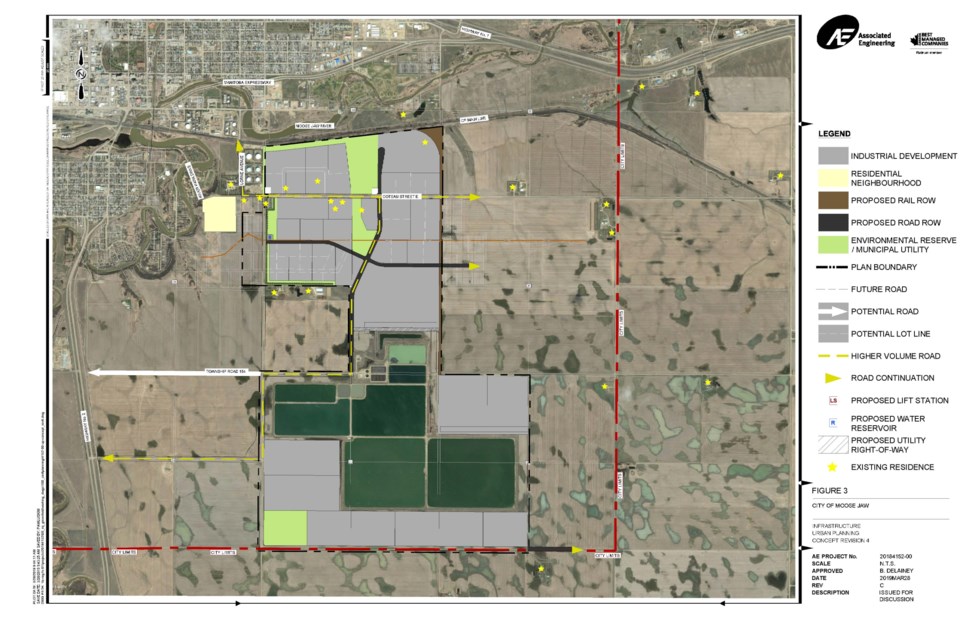Having only one opportunity to review the $700-million SaskPower agreement did not sit well with Coun. Brian Swanson, since he would have preferred more time to go over the proposal.
Normally an agreement would go to executive committee first so council could look at the risks involved, Swanson said during council’s Jan. 13 regular meeting. It concerned him that that didn’t happen and council was asked to approve a 90-page document on the spot.
SaskPower’s original proposal to purchase property in the Southeast Industrial Park (SEIP) came forward in December 2018, so it would have been great for city administration to provide feedback during the past 13 months about what was happening with negotiations, he continued. He was left in a position where he had to approve the service agreement and accompanying bylaw changes in one night.
“That doesn’t put me in a good position as an elected official responsible for transparency and accountability,” Swanson said.
Council later unanimously approved the SaskPower agreement.
One of Swanson’s other concerns focused on water infrastructure and the cost of $2.5 million to install a 400-millimetre (16-inch) water line to service the industrial park that would connect to a nearby 300-millimetre (12-inch) line. While SaskPower will pay 70 per cent of the cost, Swanson wondered why Moose Jaw had to pay 30 per cent to upgrade the pipe.
It costs money to dig a trench, but there are additional expenses for items such as valves and fittings since the pipe is increasing in size, explained Josh Mickleborough, director of engineering. The other factor is installing the new pipe would occur in built-up areas. SaskPower will need to connect to other water mains, so roads and sidewalks will have to be rebuilt afterward.
As for SaskPower paying only 15 per cent of regular costs of sewer rates, Mickleborough pointed out the only sewer materials coming from the plant will be from toilets, bathrooms, and the lunchroom. Any sewer water pumped to the lagoons would join the rest of the treated water and either be discharged into the river or used for farmland irrigation.
The agreement indicates if any industrial park tenant can renegotiate a better deal for water prices, the change would apply to all tenants. This, said city manager Jim Puffalt, was something SaskPower requested since this is a major investment; city administration thought it was reasonable.
The municipality is expected to manage all contracts but not receive any administrative fee to do so, said Swanson. A fee of eight per cent is normally charged on capital budget projects that then goes back into the capital budget.
The work will not run through the city hall’s engineering department but will be done through a contracted engineer dealing with the proposal, Puffalt said, adding a fee of 12.36 per cent would actually have been charged for these projects.
Swanson pointed out by waiving the fee, city administration is donating that service for free.
“That was subject to some negotiation and debate. In the end, this was the best deal that could be negotiated,” replied Puffalt, while acknowledging Swanson’s comment was true.
SaskPower will pay the full cost to hire the consulting and engineering firms to oversee the construction of the water line and roads, Puffalt added. City administration didn’t believe it was possible to do all engineering work in-house, while SaskPower believed it was unfair to pay for the engineering and consulting firms, plus the municipality’s eight-per-cent fee.
As for why city administration would charge only 15 per cent for wastewater use, Puffalt explained that that was a subject of debate and research. However, SaskPower indicated its processing waste would be very little, while the water would not go through municipal systems at all.
With the construction of roadways in the industrial park, he added, SaskPower will contribute funding to upgrade heavy haul roads leading there, to build a dedicated construction route, and to upgrade area roads.
The next regular council meeting is Monday, Jan. 27.




